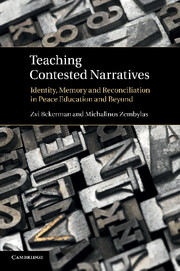Book contents
- Frontmatter
- Contents
- Acknowledgments
- Permissions
- Part I Introduction and theoretical underpinnings
- Part II Living and teaching contested narratives
- Part III Mourning, forgiveness and reconciliation
- 8 The nationalization of mourning in troubled societies
- 9 The work of mourning in schools
- 10 Forgiveness as a possible path towards reconciliation
- Part IV Conclusions
- References
- Index
10 - Forgiveness as a possible path towards reconciliation
Published online by Cambridge University Press: 05 December 2011
- Frontmatter
- Contents
- Acknowledgments
- Permissions
- Part I Introduction and theoretical underpinnings
- Part II Living and teaching contested narratives
- Part III Mourning, forgiveness and reconciliation
- 8 The nationalization of mourning in troubled societies
- 9 The work of mourning in schools
- 10 Forgiveness as a possible path towards reconciliation
- Part IV Conclusions
- References
- Index
Summary
For some, reconciliation and forgiveness might be synonymous terms; others would struggle to sustain their differences. For us these concepts represent constructs that belong to a similar semantic field – a field that includes the possibility of living with conflict, yet finding paths towards peaceful coexistence. We have already seen how this field is closely connected to issues of identity and memory. In previous chapters we touched upon these issues when discussing, for instance, students and teachers participating in commemorative events at a first-grade classroom of a bilingual school in Israel. The two events analyzed in Chapter 9 showed Palestinian and Jewish teachers’ and students’ ambivalent emotions in pedagogical efforts to engage with the work of mourning as part of the Holocaust Day and Memorial Day commemorations. We have seen Palestinian and Jewish teachers’ attempts to be “true” to the historical narratives of their respective communities, while establishing some sort of recognition towards the other community's trauma and mourning. Similarly, in the context of Cyprus (see Chapters 6 and 7) we have seen Greek Cypriot teachers and students attach themselves to a narrative that presents their suffering and victimization as unique, while the other side's trauma is not recognized. Any recognition of the other's trauma and suffering seems to be threatening to the “true” historical narrative of one's own community.
We have also seen how Palestinian teachers in the context of workshops (Chapters 4 and 5) contest the Jewish expectation for both symmetry and asymmetry: symmetry regarding the present political situation in Israel and its conflict with the Palestinian people; asymmetry regarding the non-equivalence between the way Jews suffered in the Holocaust and the way Palestinians suffer at the hands of Jews. Interestingly, the issue of symmetry and asymmetry is not raised explicitly in the context of our research in Cyprus; however, there seems to be a strong resistance to even recognize the other's loss and trauma. These negotiations around mutual recognition of loss and trauma – what has been identified as a struggle for symmetry – seem to be an essential element that might allow the first steps towards reconciliation to be taken. Yet this struggle for symmetry, which implies in a sense giving up on the attempt to be the “only victim,” is shown to be in need of critical perspectives that do not equate the suffering of the two conflicting groups, yet avoid the trap of engaging in discussions about who suffers more.
- Type
- Chapter
- Information
- Teaching Contested NarrativesIdentity, Memory and Reconciliation in Peace Education and Beyond, pp. 164 - 182Publisher: Cambridge University PressPrint publication year: 2011



